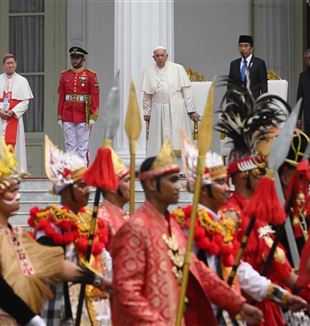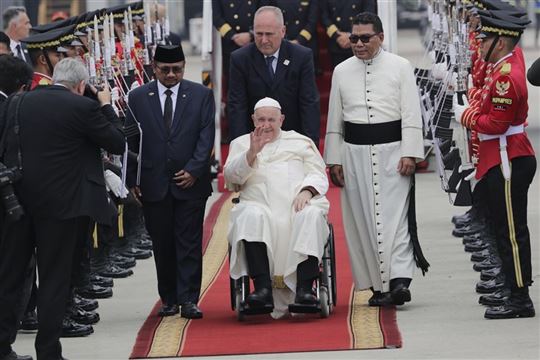
The Pope in Indonesia: A church that unites all
Both a diplomatic and an apostolic visit, during which two words have emerged clearly: “dialogue” and “reconciliation.” A priest from the CL community in Indonesia comments on Francis' trip to Asia and Oceania.On September 2, Pope Francis left Rome for Jakarta, Indonesia, where he will stay until Friday, September 6. This is the first leg of the longest trip of his pontificate. The entire Indonesian people, not just Catholics, have welcomed him enthusiastically.
When I was studying in Rome, from 2016 to 2023, I met the Holy Father personally, twice. Meeting him was an impressive experience. I imagine the same joy will be experienced by my brothers and sisters in Indonesia. And I would like to be with them, but various commitments in Italy force me to make this sacrifice. Since I cannot be there, I will try to share in that joy by sharing these lines, to explain how this is the diplomatic visit of a head of state and at the same time the pastoral visit of the head of the world's Catholics.
Indonesia became independent on August 17, 1945. The Vatican was the first “European” country to recognize its independence. This support then continued with the establishment of an apostolic nunciature in Jakarta on July 6, 1947, which accelerated Indonesia's international recognition, a fundamental condition for a country's existence. Thus, the Pope's visit – Francis is the third pontiff to visit the country, after Paul VI (1970) and John Paul II (1989) – further strengthens the bilateral relations between the two states.
From the point of view of international diplomacy, it is interesting that the Holy See and the Indonesian government are on the same wavelength in their quest for dialogue and reconciliation in relations between the countries of the world. This visit is even more important in light of upcoming leadership changes in a country that has always promoted a free and active foreign policy, which the new course – soon to be led by the newly elected Prabowo Subianto – is expected to uphold. This focus on dialogue and reconciliation actually reflects Indonesia's very DNA; it is something that is part of its history, without which it would not exist. It is the spirit behind the national motto “Bhinneka Tunggal Ika,” unity in diversity. More than 1,300 tribes, each with 500 different ethnic and linguistic groups, with 6 major religions (Islam, Confucianism, Buddhism, Hinduism, Catholicism, other Christian denominations) and various other indigenous beliefs related to tribal environments, and all the cultural differences of the 17,000 islands that make up the nation...With all of this, how can we all live together in a house called Indonesia, as we see it today?
FOLLOW THE POPE'S TRIP TO INDONESIA, PAPUA NEW GUINEA, EAST TIMOR, SINGAPORE
Last July 20, in a discussion held at a study institute founded by several young Islamic thinkers, I said that the Pope was going to Indonesia because he too needs Indonesia... The hope of world peace, built on respect for fraternity, can only be realized by uniting the forces of all men and women of good will in all nations.
Francis' trip is also an apostolic visit. The Pope is going to Indonesia to meet with Catholics, a small flock of about 10 million people, 3 percent of the population. The Pope has long wanted to go to Indonesia. On December 25, 2019, at an audience with journalists, he expressed this wish to me. The then director of the Vatican Press Office, who was next to him, pointed out to him that everything had to be discussed and well planned first. But Francis reiterated, “Yes, we will talk about it later, but I plan to stop in Indonesia and then visit Papua New Guinea, East Timor, and Singapore.” Just as is happening these days.
I think the Pope is well aware that the Indonesian Church has a unique experience in developing fraternity in pluralism. As a nation, it has sufficient cultural bearing to realize its hopes. The spirit of “Bhinneka Tunggal Ika,” the awareness of the existence of the “One” that unites all beyond diversity, reveals a unique country, a true laboratory where one can learn – living, not studying theories and documents – and where coexistence in dialogue and harmony is practiced.
Thus, today, Indonesian Catholicism takes on special significance in the missionary work of the Church. It is, in fact, the most populous Muslim-majority country in the world, but at the same time it is a fertile ground for religious vocations. There are currently nearly 1,700 Indonesian nuns and priests in Italy; sons and daughters of the Indonesian Church are missionaries in more than 40 countries around the world.
I myself come from East Nusa Tenggara (NTT), the southernmost province of Indonesia, home to more than 3 million Catholics. I teach at the Interdiocesan Higher Seminary in the city of Kupang, the capital of the province, where 300 seminarians study. People often say that the acronym NTT is short for “Nanti Tuhan Tolong” (God will provide), referring to the fact that it is one of the poorest provinces in Indonesia. Precisely because of this, many Catholics could not welcome Francis in Jakarta. Those who can, will wait for him in East Timor, which is closer and cheaper.
The great hope of us Indonesian faithful is that his visit will encourage us to live the faith in every situation of life, including economic difficulties; that it will encourage the Indonesian Church to grow, to become more fraternal and compassionate as a form of true mission. With great joy and hope: welcome, Pope Francis!
*A priest and member of the CL community in Kupang, Indonesia